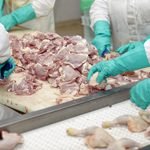You’ve made the switch from ground beef to ground turkey for your burgers and meatballs to get a lower-fat dose of protein in your diet. Congratulations! But check any packages carefully that you may have recently purchased, as there was just a massive ground turkey recall due to salmonella infection.
Salmonella breakouts usually occur when food has been handled, packaged, or cooked improperly. The most common sources of infection include animal feces, raw or undercooked meats and poultry, and eggs. The Centers for Disease Control in Atlanta estimates that each year 76 million people in the U.S. alone — or one out of every four Americans — gets sick from ingesting food-borne pathogens. That includes not only salmonella, but staph, listeria, hepatitis A, viruses, E. coli, and various parasites that are spread via unwashed hands, contaminated water, sharing dirty surfaces with contaminated sources, or eating uncooked or undercooked foods. Of the millions who get sick, about 325,000 end up in the hospital and approximately 5,000 die in the USA alone.
International conglomerate Cargill Inc. has recalled almost 36 million pounds of ground turkey that was identified as the source of 79 confirmed cases of salmonella poisoning in 26 states all across America, and was responsible for one death in California.1 The recall by the United States Department of Agriculture was considered Class I, posing the greatest health risk.
The recalled ground turkey products — all of which were produced at Cargill’s Springdale, Arkansas facility — came in various forms including patties and trays of meat. They were then sold at large supermarkets in numerous states. All of the ground turkey products that were processed at that plant between February 20 and August 2 were recalled. Although they were sold under several different brand names, the packages would have “Est. P-963” printed on the label, providing a way for consumers to determine whether they may have purchased tainted meat.
The salmonella outbreak has been going on since March, when people began exhibiting signs of the illness — which can include fever and diarrhea and can eventually lead to blood poisoning. California was the only state with a death attributed to salmonella as well as six confirmed cases of food poisoning. But there have been at least 22 people hospitalized as of August 1st around the country from this strain of salmonella. Cargill’s recall site, www.cargill.com/turkey-recall, lists all of the products involved in the recall. Return any opened or unopened package to the store at which it was purchased.
This outbreak begs several major questions: Why did it take months for the USDA to announce the recall? Consumers of the ground turkey were getting sick starting in March, and it was clearly a salmonella outbreak by May. Yet the recall did not take place until early August. This one you can’t blame on the FDA or the USDA, however. Look to Congress, which has legislated salmonella as a non-adulterant, which means that authorities cannot order a recall until a positive link is established to confirmed illness or death. Until that point, all authorities can do is tell the public that the meat is safe as long as it is cooked to 165 degrees Fahrenheit and handled properly during preparation. Makes you wonder what kind of campaign contributions got the meat packers that kind of grace period.
And it should be noted that this isn’t the first time Cargill has unleashed tainted meat on the public. In 2007, Cargill had to recall some 2 million pounds of E. coli tainted hamburger. Not to mention two outbreaks of food poisoning associated with products they provided to the Sizzler chain in 1993 and 2000 — and at least a half dozen more incidents over the last decade.2 Truly, the government smiles on Cargill. And as I mentioned earlier, it certainly has nothing to do with the political contributions made by the Cargill Incorporated Political Action Committee.3
Returning to the tainted turkey, it should be noted that this spate of illnesses is particularly worrisome since there are now some new variants of salmonella — including the one found in the Cargill ground turkey — that are resistant to antibiotics, making it much more difficult to treat an infected patient. A recent USDA study found during random testing that approximately 10 percent of the ground turkey samples they examined were contaminated by salmonella. And research suggests that as much as 80 percent of those salmonella bacteria may be resistant to at least one type of antibiotic. The salmonella in the latest outbreak is resistant to both ampicillin and tetracycline, antibiotics that the World Health Organization considers critical to human health.
And where did these super salmonella bacteria come from? Well, as it turns out to no one’s surprise, Cargill uses antibiotics in its animal feed to promote growth and to prevent the spread of disease that can decimate animals raised in intensively close-quartered, mega factory-farms. Quite simply, the overuse in animal agriculture of antibiotics critical to human medicine has weakened their effectiveness.4 How bad is the problem? Factory farms use 80 percent of the antibiotics sold in the U.S.
Instead of irradiating your food as many food “safety” experts would tell you is the best way to kill off harmful bacteria, you might want to consider buying organic meats (far less likely to contain antibiotic resistant bacteria) and produce from local purveyors that you know. Keep your immune system functioning at its highest level in case a food-borne pathogen does strike you, and it can’t hurt to have some natural pathogen destroyers in the medicine chest to get you feeling better again quickly if the worst happens.
1 Aleccia, JoNel. “Cargill Recalls 36 Million Pounds of Ground Turkey.” MSNBC. 2 August 2011. MSNBC. 10 August 2011. <http://www.msnbc.msn.com/id/43988256/ns/health-food_safety/#.TkWX0q7dQ4Q>.
2 Bill Marler, “How Big is Cargill’s Food Poisoning Problem?” 6 August 2011. Marler Blog. Accessed 12 August 2011. <http://www.marlerblog.com/legal-cases/how-big-is-cargills-food-poisoning-problem/>
3 “Cargill Inc.” Open Secrets.org. <http://www.opensecrets.org/pacs/lookup2.php?strID=C00067884>
4 Zach Goldberg. “DANGEROUS CONSEQUENCES OF FDA INACTION: 34-YEAR FAILURE TO BAN ANTIBIOTICS IN ANIMAL FEEDS CATCHES UP WITH RESISTANCE TO SALMONELLA OUTBREAK.” 5 August 2011. Keep Antibiotics Working. Accessed 12 August 2011. <http://keepantibioticsworking.com/new/PRfiles/Heidelberg%20PR%200804%20v2.pdf>











